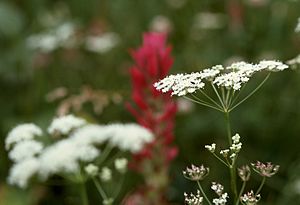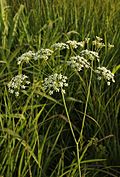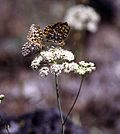Perideridia facts for kids
Quick facts for kids Perideridia |
|
|---|---|
 |
|
| Perideridia gairdneri subsp. borealis | |
| Scientific classification |
|
| Kingdom: | Plantae |
| Clade: | Tracheophytes |
| Clade: | Angiosperms |
| Clade: | Eudicots |
| Clade: | Asterids |
| Order: | Apiales |
| Family: | Apiaceae |
| Subfamily: | Apioideae |
| Tribe: | Oenantheae |
| Genus: | Perideridia Rchb. |
| Type species | |
| Perideridia americana (Nutt.) Rchb. ex Steud. 1829
|
|
| Species | |
|
About 12; see text |
|
Perideridia is a group of plants in the Apiaceae family, also known as the parsley family. These plants are commonly called yampah or yampa. They grow naturally in western North America. Yampah plants look similar to other plants in the parsley family. They have groups of small white flowers shaped like umbrellas, called umbels.
Contents
What's in a Name?
The name Perideridia comes from the Greek word perideri. This word means 'necklace'.
What Does Yampah Look Like?
Yampah plants have a special look for the parsley family. They grow quite tall, usually about 1 to 3 feet high. Their leaves are thin and long, like blades of grass, measuring 1 to 6 inches. Because they grow in grassy fields and love sunshine, yampah plants can be hard to spot until their white flowers bloom. Like most plants in the parsley family, yampah produces its flowers in umbrella-shaped clusters. The small roots of the yampah plant are about the size of a large peanut.
Where Does Yampah Grow?
Yampah plants are found in many places across Western North America. They like moist, open meadows and hillsides. You can find them growing at elevations up to about 7,500 feet high.
How People Use Yampah
Native American groups, especially the Plains Indians, called this plant 'Yampah'. They ate its starchy roots, which taste a bit like carrots.
One type, Perideridia gairdneri, was a very important food for Native Americans in Western North America. The roots are crunchy and slightly sweet. They have a texture and flavor similar to water chestnuts.
Yampah roots were often baked or steamed before eating. People said they tasted great and were very healthy. The seeds of yampah were also used to add flavor to food, much like caraway seeds. Yampah roots contain carbohydrates that give you quick energy. Hunters and runners would eat them to help them stay strong during long journeys.
If eaten in large amounts, uncooked yampah roots could help with digestion. They were sometimes used for this purpose in traditional medicine.
It's very important to know that yampah looks a lot like some other plants that are not safe to eat. These include poison hemlock and water hemlock, which are very dangerous. You should never eat wild plants unless an expert tells you they are safe.
Types of Yampah Plants
There are about 12 different types, or species, of yampah plants. Here are some of them:
| Image | Name | Common name | Where it grows |
|---|---|---|---|
| Perideridia americana | eastern yampah | Midwestern United States | |
| Perideridia bacigalupii | Mother Lode yampah, Bacigalupi's yampah | Sierra Nevada foothills, California | |
| Perideridia bolanderi | Bolander's yampah | western United States | |
| Perideridia californica | California yampah | Central Coast Ranges and a section of the Sierra Nevada foothills, California | |
| Perideridia erythrorhiza | redroot yampah, western yampah | Oregon in the United States | |
| Perideridia gairdneri | Gardner's yampah, common yampah, Indian caraway | western North America from southwestern Canada to California to New Mexico | |
| Perideridia howellii | Howell's yampah | Oregon and northern California | |
| Perideridia kelloggii | Kellogg's yampah | San Francisco Bay Area, and the Sierra Nevada foothills, California | |
| Perideridia lemmonii | Lemmon's yampah | from southeastern Oregon, western Nevada, and the mountains of eastern California | |
| Perideridia leptocarpa | narrowseed yampah | California, Oregon | |
| Perideridia montana | Gairdner's Yampah | Montana | |
| Perideridia oregana | Oregon yampah, squaw potato | Oregon and California in the western United States | |
| Perideridia parishii | Parish's yampah, Sierra Queen Anne's lace | southwestern United States | |
| Perideridia pringlei | adobe yampah | California |
See also
 In Spanish: Perideridia para niños
In Spanish: Perideridia para niños
 | Selma Burke |
 | Pauline Powell Burns |
 | Frederick J. Brown |
 | Robert Blackburn |








